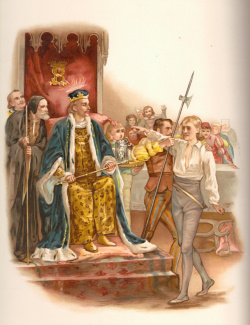King Robert of Sicily
Historical Records
Diary of the English College at St Omer’s
The ‘’Diary’’ records that in 1623 the College staged a play on the subject of superbi Imperatoris qui verba illa (deposuit potentes) ex Sacris Litteris audaciore animo deleverat casum [the fall of the arrogant Emperor who recklessly deleted the words 'he has humbled the mighty' from the Scriptures]. (McCabe, 84-5)
Theatrical Provenance
Performed at the Jesuit College at St Omer’s
Probable Genre(s)
Comedy
Possible Narrative and Dramatic Sources or Analogues
The story of Robert of Sicily.
This is a story which exists in many versions, typified by the very popular medieval English poem Robert of Cisyle. In this tale, a proud king goes to church and during the service unwisely declares that he is so powerful that nothing can remove him from his throne. He promptly falls asleep, and awakes to find the church deserted, with his own appearance transformed into that of a beggar. Robert rushes out of the church and is treated, by all of his courtiers, as a madman. No-one will believe his protestations that he is the true ruler of everyone he meets, since, as becomes apparent, a stranger has taken on Robert’s own form and supplanted him as king without anyone noticing the difference. Robert attempts to gain entrance to his throne room; scuffles with his own porter; and comes face to face with his double, who is in fact an angel in disguise.
Robert is taken from the court in disgrace, still unrecognized. He is forced to wear the garb of a fool, imprisoned, and given an ape for a counsellor, who is dressed in the same clothing as him. Still he refuses to relinquish his claim that he is the real king. After many humiliations, Robert finds that he is indeed tolerated only as a fool at the court of the new king. For three years the stranger rules Sicily with great success. Finally, Robert of Sicily has a religious conversion; realizes that he is indeed a mere fool measured against God; and accepts his new role as a fool. When he tells the impostor this, the impostor reveals that he is really an angel. He at once returns to Heaven, and Robert finds that he is once again recognized by those around him as the King of Sicily.
References to the Play
None known.
Critical Commentary
Strictly speaking, the play is untitled in the original diary record, and the title “Robert of Sicily” is editorial. Critics from Harbage onwards have had no hesitation in identifying this play, based on its description, as telling a version of that story. The story of Robert of Sicily was popular throughout Europe and throughout the early modern period. The large family of retellings of it are studied by Hornstein; and by Steggle, who enumerates thirteen extant versions of the story from early modern Continental Europe, four non-dramatic and nine dramatic. McCabe (84-5) suggests that the play used at St Omer’s might have been one of these, Sapor Admonitus by the Jesuit Louis Cellot, but Cellot's is about the one version it cannot be: Cellot’s innovation is to move the story out of Christendom, and his pagan protagonist has no obvious dealings with co pies of the Scriptures. Instead, this sounds much more like the group of versions described by Hornstein, and linked to France, in which the arrogant kind specifically orders that the verses about ‘’deposuit potentes’’ be removed from his copy of the bible. The author is generally, and reasonably, conjectured to have been Joseph Simons, who wrote much of the other drama performed at St Omer’s in this time frame. Some of Simons’s drama is extant: see McCabe, and also the edition of his play Vitus at the Philological Museum: http://www.philological.bham.ac.uk/vitus/intro.html
For What It's Worth
Robert confronts the Angel. From Longfellow, Robert of Sicily, illus. Jane Willis Grey (London, n.d.).

There are also numerous lost retellings of the story of Robert of Sicily in English drama. These include a play performed at Chester in 1569; and the lost play The Angel King, licensed by Sir Henry Herbert for the Palsgrave’s Men in 1624.
Works Cited
Page created by Matthew Steggle, University of Bristol, 7 November 2019.